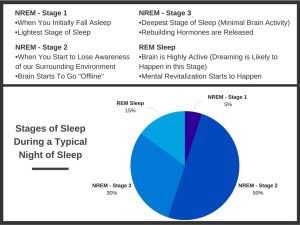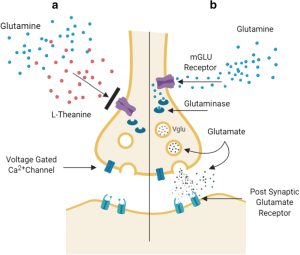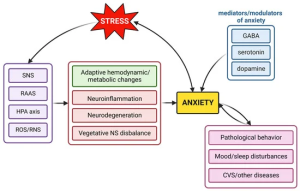Introduction
Anxiety Disorders don’t just impact your mental health and peace of mind but go even deeper into affecting your academic performance and posing a threat to your financial security and job prospects.
Studies have shown that anxiety poses a significant socioeconomic burden on countries and results in taking frequent job changes or breaks from work to deal with the stress. Several people even apply for disability status because of the inability to cope with work/occupation-related anxiety effects.
Anti-anxiety medications and nootropics
Though effective, anti-anxiety medications result in side effects, like gastrointestinal disorders and insomnia, especially when withdrawing from their use. Some meds even lead to anxiety as a side effect because of their impact on serotonin levels. Research has shown that long-term use of anti-anxiety medications can accelerate dementia because of TSPO protein ( binding to anti-anxiety meds like Diazepam) mediated loss of dendritic spines in the CNS.
In such conditions, alternative treatment options like Nootropics help reduce anxiety levels and regulate the sleep-wake cycles. Researchers have proposed that there are several ways in which nootropics help with anxiety in the form of
- moderating the cortisol levels ( stress hormones that, in heightened levels, increase the anxiety levels of the individual)
- regulating the neurotransmitters associated with calmness and relaxation
- tuning the brain waves into a more calm and relaxed state
Before proceeding further, it is essential to have a brief idea about nootropics and their acting mechanisms.
A word about nootropics
Nootropics, or smart drugs, are a diverse group of medicinal substances crucial for improving human thinking, learning, and memory. Based on their nature and their effects, they can be divided into
classical nootropic compounds
substances increasing brain metabolism
Cholinergic drugs ( mimicking the action of acetylcholine )
plants and their extracts with nootropic effects
all of which play a mild to moderate role in treating memory, learning disorders, and consciousness.
Nootropics do not act directly by releasing neurotransmitters or as receptor ligands but improve the brain’s supply of glucose and oxygen, have anti-hypoxic effects, and protect brain tissue from neurotoxicity. Studies have shown that abnormal glucose metabolism is one of the chief precursors behind stress-induced mental disturbances. Normalizing the stress-induced alterations in glucose levels can restore the spatial memory impacted by chronic anxiety.
They also positively affect neuronal protein and nucleic acid synthesis and stimulate phospholipid metabolism in neurohormonal membranes. Phospholipids are essential in regulating individuals’ heart, bone marrow, and brain-related functions. Eminent phospholipids like omega-3-PUFAs are crucial in regulating symptoms of clinical anxiety, as observed in in vitro and clinical trial-based studies.
Some nootropics even affect the elimination of oxygen free radicals, possess an anti-aggregation effect, and improve erythrocyte plasticity. This enhances the blood’s rheological properties and cerebral oxygen levels. The finding is crucial as recent studies have shown that hyperventilation, a common symptom during anxiety and panic attacks, constricts the blood vessels, causing blood to move slower than normal.
IRP Research has further shown that psychological stress can result in cerebrovascular microbleeds in scattered locations, the presence of which is associated with hemorrhagic and ischaemic stroke with increased risk of cognitive deterioration and dementia conditions. In such cases, nootropics can repair the damage and restore cellular normalcy. Animal-derived nootropics like Actovegin and Cerebrolysin have been included in trials conducted by the European Stroke Association in determining novel cognitive improvement techniques.
What do animal studies say
In an animal study conducted to determine the anti-anxiety effects of nootropics, four nootropics ;
Adafexonate- a phenoxy acetic acid derivative used in phase III clinical trials in Spain as a potential memory-enhancing agent.
Meclofenoxate – cholinergic nootropic used as a dietary supplement.
Piracetam – synthetic nootropic used to boost mental performance
And Standardized Ginseng Extract – plant-based nootropic
Were applied for five days on animal models using Vogel’s Conflict Pressure ( an experimental method used to determine the anxiolytic effects of drugs by measuring the ability to release the drinking behavior of water-deprived rats when exposed to a mild aversive stimulus or punishment ).
The results showed significant anti-anxiety effects with Adafenoxate and Meclofenoxate and anxiogenic (anxiety-inducing) effects from using Piracetam. The overall results indicated a beneficial role for the observed anti-anxiety effects of adafenoxate and meclofenoxate and stressed their possible importance in helping reduce anxiety levels.
Similarly, plant-based nootropics have been observed to protect against stress and anxiety and monitor amnesia and peptic ulcer conditions.
Anxiety and sleep
Sleep disorders are one of the most common anxiety symptoms many researchers describe as adaptive responses to stress. Human sleep consists of two qualitatively different brain states, non-rapid eye movement (NREM) and rapid eye movement. (REM) sleep, the percentage of which is decreased because of pre-sleep rumination in people with high anxiety levels.


Several models regarding sleep regulation have established the role of monoaminergic, cholinergic, and GABAergic inhibitory mechanisms in sleep regulation and strongly suggested their dysfunction in individuals with anxiety disorders and disturbed sleep-wake cycles.
In such conditions, nootropics improve the serotonin levels that improve melatonin (the main brain chemical associated with wakefulness and sleepiness ). L. Theanine is a popular nootropic or non-proteinogenic amino acid that is instrumental in improving sleep disturbances and helping relieve stress and anxiety. L. Theanine is structurally similar to the excitatory neurotransmitter glutamate ( a neurotransmitter related to memory ) that exerts an antagonistic effect on the glutamate receptors to exert a cerebroprotective effect and prevent neural cell death that is a significant contributor to increased stress levels and sleep impairment.

In addition, L Theanine boosts the CNS’s GABA, serotonin, and dopamine levels, producing a calming effect and suppressing negative emotions like stress, fear, and anxiety. Phenibut is another synthetic nootropic that stimulates dopamine receptors and antagonists beta-phenethylamine (PEA), a putative endogenous anxiogenic to relieve tension, anxiety, and fear and improve sleep in psychosomatic or neurotic patients or those undergoing surgery.

It is also used in the therapy of disorders characterized by asthenia ( physical weakness ) and depression, as well as in post-traumatic stress, stuttering, and vestibular disorders impacting a person’s behavior and speech.
Conclusion
While establishing the importance of nootropics in improving and reducing anxiety, the fact remains that, to date, limited clinical studies have been conducted on evaluating their relationship with the human system and delving into their benefits. Most of these studies have been animal-model based, with rare cases of very small-scale human studies conducted to understand their anxiolytic and sedative benefits. The available evidence is sufficient to infer their role in cognitive behavior. But further large-scale studies are required to understand the role of nootropics on anxiety and sleep.
https://pubmed.ncbi.nlm.nih.gov/2896427/
https://www.sciencedaily.com/releases/2018/10/181024122411.htm
https://jamanetwork.com/journals/jamanetworkopen/fullarticle/2702216
https://pubmed.ncbi.nlm.nih.gov/32413560/
https://www.sciencedirect.com/science/article/abs/pii/S0091305704001935
https://www.ncbi.nlm.nih.gov/pmc/articles/PMC3181635/




